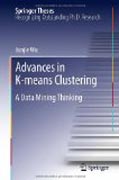
Nearly everyone knows K-means algorithm in the fields of data mining and business intelligence. But the ever-emerging data with extremely complicated characteristics bring new challenges to this "old" algorithm. This book addresses these challenges and makes novel contributions in establishing theoretical frameworks for K-means distances and K-means based consensus clustering, identifying the "dangerous" uniform effect and zero-value dilemma of K-means, adapting right measures for cluster validity, and integrating K-means with SVMs for rare class analysis. This book not only enriches the clustering and optimization theories, but also provides good guidance for the practical use of K-means, especially for important tasks such as network intrusion detection and credit fraud prediction. The thesis on which this book is based has won the "2010 National Excellent Doctoral Dissertation Award", the highest honor for not more than 100 PhD theses per year in China. INDICE: Cluster Analysis and K-means Clustering: An Introduction.- The Uniform Effect of K-means Clustering.- Generalizing Distance Functions for Fuzzy c-Means Clustering.- Information-Theoretic K-means for Text Clustering.- Selecting External Validation Measures for K-means Clustering.- K-means Based LocalDecomposition for Rare Class Analysis.- K-means Based Consensus Clustering.
- ISBN: 978-3-642-29806-6
- Editorial: Springer
- Encuadernacion: Cartoné
- Fecha Publicación: 30/06/2012
- Nº Volúmenes: 1
- Idioma: Inglés
